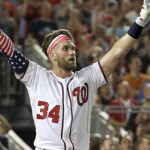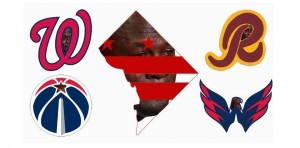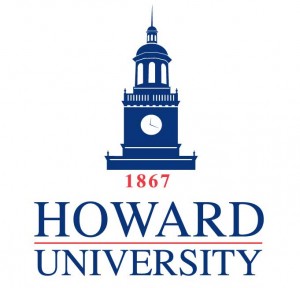When Washington Nationals All-Star and former NL MVP Bryce Harper departed last week via free agency for Philadelphia, it further validated a baffling phenomenon in sports for me; How come top-tier free agents neither stay in nor find Washington, DC to be an attractive destination?
Ok, for $330 million dollars, many of us who love DC would gladly leave for Mars. 
But the evidence of this reality long preceded Harper. Kevin Durant would not even give his hometown team, the Wizards, an interview. The last big-name free agent to sign with a Washington team was Albert Haynesworth.
That did not work out quite so well.
Normally, I pose a question and answer according to the world of Gus…supported by as much history and current day facts as I can find. Not this time. I have no idea why free agent marquee athletes don’t consider Washington as a viable option.
There are the usual suspects as explanations go such as the “lukewarm” enthusiasm of the Washington fan base about its teams.
I must come to the defense of DC fans on this one. Other than the magical title run of the Caps last year, what have the collective of Washington Sports teams produced on a consistent basis that would excite any fanbase over the past 25 years? Besides, does anyone think that San Diego fans are any more hyped about the Padres? Yet, Manny Machado signed there for the same $300 million that the Nats offered Harper, and I am sure would have given Machado.
Then there is organizational mediocrity to outright dysfunction.
To that I say that the high functioning organizations are rarely big players in the free agent market because, by definition, they need the least help. How often over the past 20 years have the Spurs or Patriots been big players? Baseball is a different animal because it does not have a salary cap, and the luxury tax is hardly a disincentive for the likes of the Red Sox, Dodgers, and Yankees. Simply put, in most cases the team that the upper echelon free agent bypassed Washington for, is likely to be as dysfunctional as the DC team. Why is their dysfunction more attractive than ours?
So what the hell is wrong with DC? We have a bustling metropolis with diversity to spare. We are relatively progressive in a political sense. If the city is not one’s preference, there are the beautiful Maryland suburbs or the rural Virginia suburbs.
For young Black athletes, which make up the majority of the NFL and NBA free agents, I am even more mystified. Why on Earth wouldn’t a young Black man with a pocket full of cash and at the height of his physical prime not be attracted to Washington DC?
This brings me to a possible solution for the football and basketball teams: Howard University!
Both teams need to partner with the venerable HBCU. No, not to hire young women in the classless, exploitative way some colleges do to lure recruits. They would simply arrange visits to campus during the fall and spring semesters. One stroll across “the yard”, and the free agent success rate will immediately improve.
I know! I AM A HOWARD MAN!
Otherwise, I am open for other ideas about why Washington cannot attract high-caliber free agents. I am all ears.




